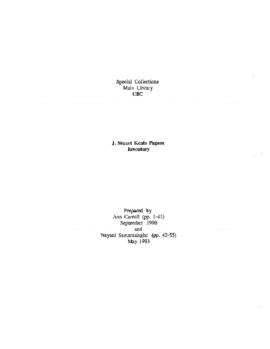- UBCA-ARC-1426
- Fonds
- 1994-2007
The fonds consists of 44 separate archival series most of which are based on specific production titles. For each title there is a digital master copy of the program(s). Each production includes a set of video and audio elements, the bulk of which are original shoot tapes. In addition there is also corresponding textual material that helps provide context and background for the development of the various projects. The textual and a/v materials have been described in separate sections of the inventory. For both sets of material the numbers assigned during the original cataloguing and creation of the database have been retained and appear in square brackets [ ] as part of the descriptions to allow for cross referencing as necessary.
First donation: This donation is Paperny Film's first to an archival repository and it represents 27 of the company's indigenous proprietary titles (1996-2004) of their approximately 55 non-fiction productions (1996-2007). The collection is comprehensive in that it offers digital master copies of each of the title/series included in this donation. There are 62 original masters that include over 50 hours of recordings. There is also a DVD copy of each of the master tapes to provide easy access to the information.
The collection features over 1900 a/v elements arising from some 27 separate productions. The scope of material includes: BetacamSP, MiniDV, Digial Betacam, DVD, VHS, CDs and digital audio tapes. The majority of the collection consists of original shoot tapes. There are over 1,000 hours of video recordings featuring prominent Canadian including Mortecai Richler, Henry Morgentaler, Jimmy Pattison, and Nancy Green.
In addition to the obvious importance of providing access to full interview interviews with and about prominent Canadians, the a/v elements are also quite instructive in helping communicate an understanding of the creative process that gave rise to particular productions.
The textual material extents to approximately 5.15 metres and also includes over 13,000 photographic images. The images document the various production shoots and, in some cases, include copies of historical photographs/documents that were used in the productions.
Examples of the types of records included with the textual material include: treatments, outlines, synopses, proposals; collected research materials; correspondence relating to development, production, publicity; original interview notes and transcripts, interview schedules; scripts (and drafts), storyboards; production schedules, production reports and daily call sheets; publicity stills, negatives, transparencies and digital photographs; marketing plans, publicity packages, one-sheets, press releases and coverage; transcripts of completed shows; EDL's (edited decision list), assembly notes, tape logs; credit rolls, final credits and super lists.
Of particular interest in the textual material are a set of handwritten notebooks created by David Paperny, Audrey Mehler and others. Seventeen in total, these notebooks are in Box 1 (3,4,5,6,11,12,13,14,15); Box 4 (3,8); Box 6 (17); Box 11 (23a); and Box 12 (8).
Second donation: The second donation from Paperny Film's represents 15 of the productions (1993-2006) including the Academy Award nominated The Broadcast Tapes of Dr. Peter. The collection offers digital master copies of each of the title/series included in this donation. There are 183 original masters and a DVD copy of each to provide easy access to the
information.
The collection features over 1200 AV elements arising from 15 separate productions, some of which have several seasons associated with them. The scope of material includes: BetacamSP, MiniDV, Digital Betacam, DVC Pro, DVCAM, Betacam SX, DVD, VHS, CDs and digital audio tapes. The majority of the collection consists of original shoot tapes.
There are roughly 75 cm of textual material in the newest accession.
Examples of the types of records included with the textual material include: episode synopses, outlines and storyboards; graphics; proposals; collected research materials; correspondence; original interview notes and transcripts; schedules; research notes and materials; scripts; publicity stills, negatives, transparencies and digital photographs; marketing plans, advertisements, publicity packages, one-sheets, press releases and coverage; and transcripts of completed shows.
The textual material also includes handwritten notebooks created by David Paperny, found in Box 77 (1-12) and Box 78 (1-8).
Paperny Films
